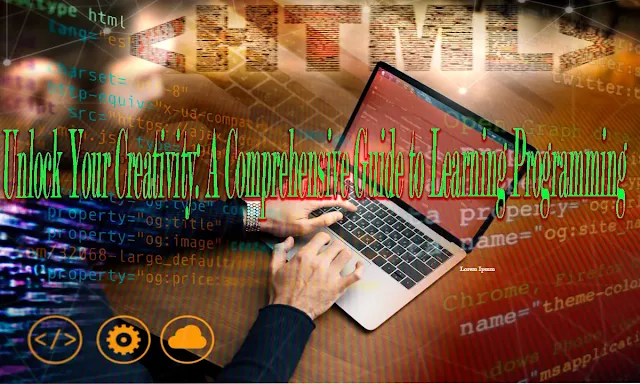Unlock Your Creativity: A Comprehensive Guide to Learning Programming
Programming is the language used to give instructions to computers. It is a set of rules and commands that tell the computer what to do. Programming is similar to written language, but instead of writing sentences and words, we write code.
Unlock Your Creativity: A Comprehensive Guide to Learning Programming

Programming is used all around us. From operating smartphones to running the internet, almost everything we see and use relies on programming.
Why Learn Programming?
There are many benefits to learning programming, including:
- Personal Growth: Learning programming helps you develop logical thinking and problem-solving skills, enhances your creativity, and fosters your innovation capabilities.
- Career Opportunities: Programmers are among the most in-demand professions in today's job market, with various job opportunities in different fields.
- Building Personal Projects: You can use your programming skills to build your own projects, such as a website, a mobile app, or a game.
Who Can Learn Programming?
Anyone can learn programming, regardless of their age or technical background. There are no prerequisites for learning programming, all you need is the desire to learn and perseverance.
First Steps in Your Programming Journey:
- Choose the Right Language: There are many programming languages, each with its own characteristics and uses. You need to choose the language that suits your goals.
- Select a Learning Platform: Many educational platforms offer courses to learn programming. Choose the platform that suits your learning style.
- Start with the Basics: Start by learning the basics of programming, such as variables, functions, loops, and branching.
Tips for Beginners:
- Focus on Practice: Don't just read books or watch videos, practice what you've learned.
- Don't Fear Mistakes: Mistakes are part of the learning process, don't be afraid of them, but learn from them.
- Join Programming Communities: There are many programming communities online, join them to get help and support.
- Enjoy the Journey: Learning programming is a fun journey, enjoy it and celebrate your achievements.
Available Educational Resources:
- Free Educational Websites: Edraak, HSoub Platform, Coursera
- Online Courses: Udemy, Udacity, edX
- Educational Books: "Automate the Boring Stuff with Python" and others
- Interactive Tutorials: Codecademy, Khan Academy
Training Projects to Apply Your Skills:
- Build a Simple Website: Start by building a simple website to apply your HTML and CSS skills.
- Create a Small Game: Try creating a small game to apply your programming skills.
- Automate a Routine Task: Use your programming skills to automate a routine task you perform on your computer.
From Beginner to Pro
Once you have mastered the basics, you can specialize in a specific area of coding, such as:
- Web development: Building websites and web applications.
- Mobile app development: Building apps for smartphones.
- Artificial intelligence: Developing intelligent systems that allow computers to learn and think.
Tips for Staying Up-to-Date
The field of coding is constantly evolving, so it is important to stay up-to-date on the latest trends. Here are a few tips:
- Read blogs and websites dedicated to coding.
- Enroll in online courses and tutorials.
- Attend conferences and events related to coding.
- Network with other coders and share your knowledge.
Coding: More Than Just a Technology
The benefits of learning to code go beyond just technology. It can also help you to:
- Develop logical thinking and problem-solving skills.
- Foster creativity and innovation.
- Become part of a global community of creators.
Conclusion: Coding is a Gateway to a World of Possibilities
Learning to code is a fun and rewarding journey. With practice and perseverance, you will be able to master coding skills and achieve your goals.
FAQs
1. Do I need a strong mathematical background to learn to code?
No, you do not need a strong mathematical background to learn to code. While some mathematical concepts may help you in some areas, the basics do not require advanced mathematical knowledge.
2. What is the best language for beginners?
It depends on your goals. Some popular languages for beginners include:
- Python: An easy-to-learn language with wide applications.
- Java: A powerful and reliable language used to build many applications.
- JavaScript: A language essential for web development.
3. How long does it take to learn to code?
It depends on your time and effort. You can learn the basics in a few months, while mastering advanced coding skills may take several years.
4. How do I find training projects suitable for my level?
There are many websites that offer training projects for coders of all levels. Some examples include:
- GitHub: An open-source platform that offers many programming projects.
- Codewars: An interactive platform that offers coding exercises for beginners.
- HackerRank: A platform that offers coding competitions for coders of all levels.
5. What are the job opportunities available for coders?
There are many job opportunities available for coders in various fields. Some examples include:
- Web development: Building websites and web applications.
- Mobile app development: Building apps for smartphones.
- Artificial intelligence: Developing intelligent systems that allow computers to learn and think.
- Data science: Analyzing data and extracting information from it.
- Cybersecurity: Protecting computer systems from cyberattacks.
Note:
- This article is just an introduction to learning to code. There are many resources available to help you learn more.
- Do not hesitate to ask questions to other coders or on coding forums.
- Remember that the most important thing is perseverance and practice.
I hope this article has helped you understand the importance of learning to code and how to get started on your journey.
